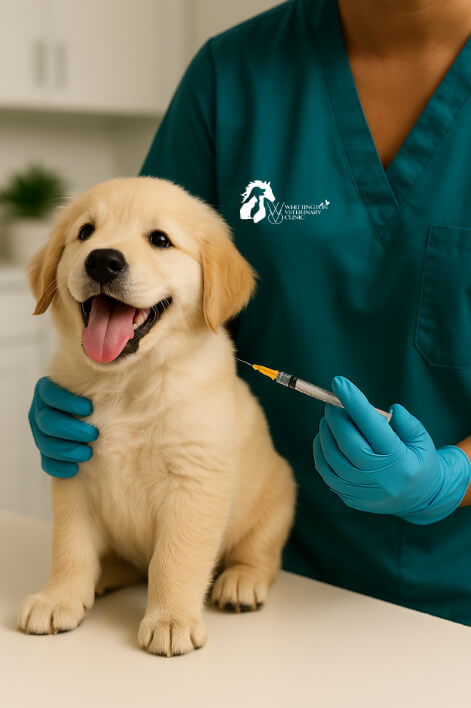Dog Vaccines 101: What They Are, What Your Dog Needs, and Why They Matter for a Lifetime of Health
 At Whittington Veterinary Clinic, we know that in South Louisiana, pets aren’t just companions—they’re family. Vaccinations are one of the most important steps you can take to protect your dog from dangerous (and often preventable) diseases that can seriously affect their health and quality of life.
At Whittington Veterinary Clinic, we know that in South Louisiana, pets aren’t just companions—they’re family. Vaccinations are one of the most important steps you can take to protect your dog from dangerous (and often preventable) diseases that can seriously affect their health and quality of life.
Our veterinary team has put together clear, trustworthy answers to the most frequently asked questions about dog vaccinations—so you can feel confident in giving your pup the protection they need.
What Exactly Are Dog Vaccinations?
At Whittington Veterinary Clinic, we often get asked, “What are dog vaccines, and why do they matter?” Simply put, vaccinations are a safe and essential way to protect your dog from serious, and sometimes life- threatening, diseases.
Vaccines work by introducing a small, harmless piece of a virus or bacteria into your dog’s body. This helps their immune system recognize and learn how to fight that specific disease—so if your dog is ever exposed in the future, they’re much less likely to get sick.
We start vaccinations in the puppy stage and continue them throughout adulthood. The exact vaccine schedule and types we recommend will depend on your dog’s age, lifestyle, and potential exposure risks. Our goal is to create a plan that gives your pup the protection they need to live a long, happy, and healthy life here in South Louisiana.
How Do Vaccinations Impact the Health and Well-Being of My Dog?
Vaccinations play a vital role in protecting your dog from dangerous and often deadly diseases like parvovirus, distemper, and rabies. These illnesses are not only extremely serious—they’re also highly contagious and, in some cases, fatal. Sadly, unvaccinated puppies are especially vulnerable, as their immune systems aren’t fully developed.
The good news? These diseases are completely preventable with timely vaccinations. By keeping your dog up to date on their vaccines, you’re giving them a strong line of defense and sparing them from the pain and suffering these illnesses can cause. At Whittington Veterinary Clinic, we believe prevention is the best medicine—and vaccines are one of the most powerful tools we have to keep your pet healthy, happy, and by your side for years to come.
Are Vaccinations Required by Law?
Yes—rabies vaccination is required by law in the state of Louisiana for both dogs and cats. That’s because rabies is a zoonotic disease, meaning it can be transmitted to humans, and once symptoms appear, it’s almost always fatal.
Rabies can be spread through the bite or saliva of infected wildlife, such as raccoons, bats, or foxes, which are common in South Louisiana. Vaccinating your pet not only protects them from this deadly virus but also helps safeguard your family and community.
At Whittington Veterinary Clinic, we take rabies prevention seriously. In fact, we require all pets to be current on their rabies vaccine before we can dispense medications like flea and tick preventatives or prescription diets. For the safety of all our patients and staff, pets must have up-to-date rabies vaccinations to be eligible for boarding and select services at our clinic.
If your pet bites someone and isn’t vaccinated, you could be facing health department involvement, mandatory quarantine, or even legal consequences. Getting that rabies vaccination isn’t just smart—it’s essential.
Does My Dog’s Lifestyle Affect Which Vaccines Are Recommended?
Absolutely! Your dog’s lifestyle plays a big role in determining which vaccines we will recommend.
There are core vaccines—like rabies, parvovirus, and distemper—that we recommend for all dogs, no matter their lifestyle. These protect against some of the most serious and contagious diseases.
Beyond that, we consider your dog’s daily routine and social activity. If your dog visits dog parks, goes to the groomer, boards often, or attends doggie daycare, they’re more likely to come into contact with other dogs. In those cases, we may recommend additional protection with vaccines like Bordetella (kennel cough). At Whittington Veterinary Clinic, we customize each vaccine plan to fit your dog’s lifestyle and risk level—so you can feel confident they’re protected in all the right ways.
How Soon Should I Get My Dog Vaccinated?
At Whittington Veterinary Clinic, we begin vaccinating puppies as early as 6 to 8 weeks of age. Around this time, a puppy’s natural immunity from their mother begins to wear off, and it’s important to help their immune system build its own protection. We typically start with vaccines for distemper, adenovirus, parvovirus, Bordetella, and parainfluenza.
To build strong, lasting immunity, puppies need booster vaccines every 3 to 4 weeks until they’re around 16 weeks old. At that point, their immune system is mature enough to respond more effectively to vaccines and develop long-term protection.
For dogs that board frequently, keep in mind that some facilities require Bordetella every six months, and we’re happy to help keep your dog on the right schedule.
Getting your puppy started on time—and staying consistent with boosters —is key to protecting them during this vulnerable stage.
Is It Really That Important to Limit My Puppy’s Socialization Until They're Fully Vaccinated?
Yes—it’s extremely important. Until your puppy is fully vaccinated, their immune system is still developing, and they’re especially vulnerable to serious illnesses like parvovirus and distemper, which are not only highly contagious but often deadly.
At Whittington Veterinary Clinic, we strongly recommend avoiding contact with unknown dogs or places where unfamiliar animals frequently visit—like dog parks, rest stops, pet store floors, or public walking trails. These areas can harbor viruses and bacteria left behind in urine or feces, even if you don’t see it.
That said, your puppy doesn’t have to live in complete isolation. Safe, supervised socialization is still important for development. You can introduce them to healthy, vaccinated dogs you know and trust—such as those owned by close friends or family—as long as those dogs show no signs of illness like diarrhea, vomiting, or coughing.
Also important: Vaccines administered at our veterinary clinic are properly stored and temperature-regulated, and they’re backed by the manufacturer—something you can’t guarantee with store-bought or farm supply vaccines. When it comes to protecting your puppy’s health, quality and proper handling make a big difference.
If you brought your puppy home from a breeder, don’t forget to bring along any medical or vaccination records you received. These records help our veterinary team understand what vaccines your puppy has already received and allow us to create a personalized vaccination plan to keep them fully protected moving forward.
We know it’s tempting to show off your new pup, but just a few weeks of caution now can help prevent a lifetime of regret. If you have questions about when it’s safe to socialize or where your puppy is in their vaccine series, give us a call—we’re happy to guide you every step of the way.
Why Is It So Important Not to Miss a Dog Vaccination?
At Whittington Veterinary Clinic, we can’t stress this enough: staying on schedule with your dog’s vaccines is critical to their health and protection. Vaccine timing is based on years of research about how long immunity lasts—and when your dog is most vulnerable.
For puppies, that schedule is especially important. Their immune systems are still developing, and the initial booster vaccine given every 3 to 4 weeks help train their immune cells to recognize and fight off serious diseases like parvo, distemper, and more. If a booster is missed or delayed, your puppy may not have full protection, leaving a dangerous gap where illness can strike.
While adult dogs have more established immunity, they still need regular boosters—typically every year—to maintain long-term protection. These boosters act as reminders for the immune system, keeping those disease- fighting cells alert and ready.
Missing a vaccine may seem like no big deal—but it can leave your dog unprotected when they need it most. If you're unsure about your pet’s schedule or think they might be overdue, give us a call at (337) 893-8522. We’ll help get them back on track and safely covered.
What Is a Vaccine Reaction in Dogs?
A vaccine reaction is an uncommon but possible response where a dog’s immune system becomes overstimulated after receiving a vaccine. While most dogs experience no side effects at all, it's important to be aware of the signs—just in case.
These reactions are very rare, and the benefits of vaccination far outweigh the risks. However, at Whittington Veterinary Clinic, your pet’s safety is our top priority.
Possible symptoms of a vaccine reaction include:
- Facial swelling
- Vomiting or diarrhea
- Hives or itching
- Extreme tiredness or collapse
- Swelling at injection site
- Painful to the touch
- Limping
If we suspect your dog may be at risk for a reaction—or begins to show any concerning symptoms—we’ll keep them at the clinic for monitoring to ensure they’re safe and cared for.
We also take special precautions with dogs who have had previous vaccine reactions, adjusting their care plan as needed to prevent it from happening again.
If you have any questions or concerns about your dog’s vaccines, don’t hesitate to call us at (337) 893-8522. For more trusted information, the AVMA (American Veterinary Medical Association) is also a great resource.
